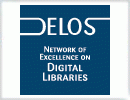
DELOS NoE
Introduction
Digital Libraries (DL) have been made possible through the integration and use of a number of IC technologies, the availability of digital content on a global scale and a strong demand for users who are now online. They are destined to become essential part of the information infrastructure in the 21st century.
The DELOS network intends to conduct a joint program of activities aimed at integrating and coordinating the ongoing research activities of the major European teams working in Digital Library - related areas with the goal of developing the next generation Digital Library technologies. The objective is to:
- define unifying and comprehensive theories and frameworks over the life-cycle of Digital Library information,
- build interoperable multimodal/multilingual services and integrated content management ranging from the personal to the global for the specialist and the general population. The Network aims at developing generic Digital Library technology to be incorporated into industrial-strength Digital Library Management Systems (DLMSs), offering advanced functionality through reliable and extensible services.
The Network will also disseminate knowledge of Digital Library technologies to many diverse application domains. To this end a Virtual Digital Library Competence Centre has been established which provides specific user communities with access to advanced Digital Library technologies, services, testbeds, and the necessary expertise and knowledge to facilitate their take-up.
Other important objectives are:
- to network and structure European Digital Library - related research in order to consolidate an emerging community;
- to provide a forum where researchers, practitioners, and representatives of interested applications and industries can exchange ideas and experiences;
- to promote an exchange programme towards improving international cooperation in Digital Library research areas.
SZTAKI is involved in two workpackages of DELOS: evaluation and interoperability:
Evaluation of Digital Libraries
Today most digital library (DL) evaluations use specific systems, which are difficult to compare. The aim of this effort is to provide a standard testbed framework for comparative evaluation of DL systems. Based on a theoretical framework for DL evaluation, we will develop a framework system to guide the stakeholders of an DL evaluation and to provide a communication and sharing platform. Thus, stakeholders can work more efficiently by using the DELOS evaluation framework for their scientific research. A second aspect of this task are actual evaluations of any aspect in the field of DLs, in order to enhance tasks and services.
Within the standard evaluation framework we propose a standard logging framework which provides an XML-based unified description of events during digital library usage. Along with the logged events we also implemented graphical tools to generate statistical information based on the logged data.
The Daffodil system is proposed as a digital library testbed. A standard DL testbed provides easy ways to experiment and compare services, collections and usage scenarios. Daffodil offers the following features as testbed:
- Easy integration of test data through wrappers (SQL, Z39.50, OAI, etc.)
- Easy integration of new services into user workspace
- Customisable graphical user interface
Ontology-driven Interoperability
The key aim is to achieve semantic interoperability at both data and metadata levels. Knowledge Organization Systems (KOS), such as classifications, gazetteers and thesauri provide a controlled vocabulary and model the underlying semantic structure of a domain for purposes of retrieval. Ontologies provide a higher level conceptualisation with more formal definition of roles and semantic relationships. The objective of this project is the investigation and development of methods for the integration of heterogeneous data types, models, upper level ontologies and domain specific KOS. This effort is driven by a core ontology called CIDOC CRM (ISOCD21127).
SZTAKI experiments with query facilities in the scenario of multiple mapped ontologies. The CORES registry operated by SZTAKI contains more than 30 metadata schemas (element sets, application profiles, etc.) which can be browsed and searched in a connected way. This registry was connected with an OAI service provider with 500.000 records. The connection enables automatic adaptation of the service provider to schema changes. Furthermore, SZTAKI implemented a web-based search interface which is capable to construct and execute queries combining the use of several metadata schemas. To find more details about this interface please read our paper.
UNIVERSITEIT VAN AMSTERDAM, The NETHERLANDS
FRAUNHOFER GESELLSCHAFT ZUR FOERDERUNG DER ANGEWANDTEN FORSCHUNG E.V., GERMANY
KURATORIUM OFFIS E. V., GERMANY
UNIVERSITY OF LEEDS, UNITED KINGDOM
INSTITUT NATIONAL DE RECHERCHE EN INFORMATIQUE ET EN AUTOMATIQUE, FRANCE
TECHNISCHE UNIVERSITAET WIEN, AUSTRIA
THE UNIVERSITY OF EDINBURGH, UNITED KINGDOM
UNIVERSITA DEGLI STUDI DI BARI, ITALY
UNIVERSITAET BREMEN, GERMANY
BRUNEL UNIVERSITY, UNITED KINGDOM
SICS, SWEDISH INSTITUTE OF COMPUTER SCIENCE AB, SWEDEN
STICHTING CENTRUM VOOR WISKUNDE EN INFORMATICA, The NETHERLANDS
UNIVERSITA DEGLI STUDI DI MILANO, ITALY
INSTITUTE OF COMMUNICATION AND COMPUTER SYSTEMS, GREECE
MAGYAR TUDOMANYOS AKADEMIA SZAMITASTECHNIKAI ES AUTOMATIZALASI KUTATO INTEZET, HUNGARY
NORGES TEKNISK-NATURVITENSKAPELIGE UNIVERSITET NTNU, NORWAY
MAX-PLANCK GESELLSCHAFT ZUR FOERDERUNG DER WISSENSCHAFTEN E.V., GERMANY
RISOE NATIONAL LABORATORY, DENMARK
UNIVERSITY OF BATH, UNITED KINGDOM
UNIVERSITY OF STRATHCLYDE, UNITED KINGDOM
MASARYKOVA UNIVERZITA V BRNE, CZECH REPUBLIC
ARISTOTLE UNIVERSITY OF THESSALONIKI, GREECE
THE UNIVERSITY OF GLASGOW, UNITED KINGDOM
NATIONAL AND KAPODISTRIAN UNIVERSITY OF ATHENS, GREECE
TECHNICAL UNIVERSITY OF CRETE, GREECE
UNIVERSITA DEGLI STUDI DI FIRENZE, ITALY
FOUNDATION FOR RESEARCH AND TECHNOLOGY - HELLAS, GREECE
UNIVERSITAET DUISBURG-ESSEN - STANDORT DUISBURG, GERMANY
IONIAN UNIVERSITY, GREECE
FORMA (CENTRO DI) FORMAZIONE E RICERCHE PER METODOLOGIE APPLICATE ALLA CONSERVAZIONE, GESTIONE E COMUNICAZIONE DEI BENI CULTURALI E AMBIENTALI, ITALY
NATIONAAL ARCHIEF, The NETHERLANDS
INSTITUT FUER MEDIZINISCHE INFORMATIK UND TECHNIK TIROL, GMBH, AUSTRIA
OESTERREICHISCHE AKADEMIE DER WISSENSCHAFTEN, AUSTRIA
UNIVERSITA DELLA SVIZZERA ITALIANA, SWITZERLAND
EIDGENOESSISCHE TECHNISCHE HOCHSCHULE ZUERICH, SWITZERLAND
INSTITUT FUER INFORMATIONSVERARBEITUNG UND COMPUTERGESTUETZTE NEUE MEDIEN, AUSTRIA
CONSIGLIO NAZIONALE DELLE RICERCHE, ITALY
UNIVERSITA DEGLI STUDI DI URBINO CARLO BO, ITALY
UNIVERSITA DEGLI STUDI DI MODENA E REGGIO EMILIA, ITALY
UNIVERSITA DEGLI STUDI DI ROMA "LA SAPIENZA", ITALY
LUNDS UNIVERSITET, SWEDEN
QUEEN MARY AND WESTFIELD COLLEGE, UNIVERSITY OF LONDON, UNITED KINGDOM
UNIVERSITAET ZU KOELN, GERMANY
THE UNIVERSITY OF SOUTHAMPTON, UNITED KINGDOM
UNIVERSITA DEGLI STUDI DI PADOVA, ITALY
UNIVERSITE PARIS-SUD, FRANCE